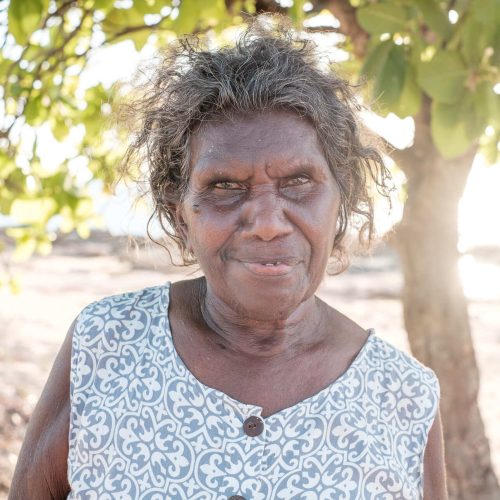The MJD Foundation partners with Aboriginal & Torres Strait Islander communities to support families living with Machado-Joseph Disease (MJD) and Spinocerebellar Ataxia Type 7 (SCA7) by providing specialised knowledge and supports. We collaborate to conduct research, providing hope for the future, and use our influence for change so people living with MJD and SCA7 live stronger for longer.

Gayangwa is a Warnindilyakwa woman of Groote Eylandt. She is 80 years old, and Machado-Joseph Disease has been a part of her life for as long as she can remember. Her father developed the disease when he was an older man, and all 6 of her brothers and sisters were affected by their 40s. She was the primary carer for two of her sisters’ children for over 15 years. Now the third generation of her family is sick – her 21 year old niece passed away in 2014, and she has nieces, nephews and grandchildren with the disease. Few people have the insight and experiences living with the disease that Gayangwa has, and she brings to her role within the MJD Foundation a fierce determination to improve life for her family. Her journey through ‘shame’ and ‘blame’ to proud champion is an encouragement to the many people she meets, and her quiet dignity and perseverance for them is an inspiration.
The MJD Foundation would like to congratulate our very own Libby Massey for the first journal article from the PhD research she has been doing
Are you a strong leader with a clinical background? Are you passionate about providing the best Community Services for our clients working 'Our Way'; in
Who we are The MJD Foundation partners with and supports Aboriginal & Torres Strait Islander families living with Machado Joseph Disease (MJD) and Spinocerebellar Ataxia Type 7 (SCA7) to live fulfilling and rewarding lives. The MJDF is an Aboriginal organisation and we take our core values from....
info@mjd.org.au
1300 584 122
ABN: 65 159 208 867
MJD Foundation
DARWIN
PO Box 1745
Nightcliff NT 0814
GROOTE EYLANDT
PO Box 85
Alyangula NT 0885
CAIRNS
PO Box 606
North Cairns QLD 4870
MJDF acknowledges Traditional Owners of Country throughout Australia and recognises the continuing connection to lands, waters and communities. We pay our respect to Aboriginal and Torres Strait Islander cultures; and to Elders both past and present. Aboriginal and Torres Strait Islander people should be aware that this website may contain images, voices or names of deceased persons in photographs, film, audio recordings or printed material.
My name is Gayangwa Lalara and this is my community.
I am a Warnindilyakwa woman.
Names are important to Aboriginal people.
Aboriginal people have names for everything, because it is important to identify and understand.
When this sickness came to our community many years ago, we didn’t know its name or what it was or how to stop it.
We didn’t know how to care for our sick people.
This sickness did not respect my family and took away 2 of my sisters and a 2 of my brothers. I have, for 15 years, cared for 2 of my sister’s children, and now I see younger ones in my family are sick. My 14-year-old niece is now in a wheelchair.
No one was interested in helping my people, especially my family, because their needs were so great.
I felt shame and we blamed ourselves.
I now know the disease has a name – Machado-Joseph Disease (MJD).
Knowing the name of this disease has not stopped it affecting my family and others, but has helped us understand it a little better, and now people are helping.
We have wheelchairs and ramps in many of our homes, and our community has built this aged care centre. Here, those with a disability and those who care are given respite. When people finish up, they don’t have to be in Darwin and away from their country and family. They are supported when they die here in Angurugu.
But we don’t want our people to suffer from MJD and die unnecessarily.
I am pleased people now see the problem and want to help my people who are suffering and find out how to help those who have the disease and those who will get the sickness in the future.
I am pleased that there is help from not only inside my community but people from the outside, even from overseas.
I don’t feel shame and we don’t blame ourselves anymore.
I feel proud to be part of a mob of people trying to make a difference for my people.
Before we didn’t know what this disease was, we struggled to care, there was no hope for the future and we felt shame.
Now we know what the disease is, it is a little easier to care – there is hope for the future.
And we are proud in our care, and in fighting this disease, and proud of the MJD Foundation.
We not only know the name of the disease, but we know the names of all the people who are joining with aboriginal people to make a difference for those with MJD, those who care for them.
Libby Morgan grew up on this island, and she wanted to do something to help those with MJD. She has worked from the start on setting up this Foundation.
She has done so much and left her family to come back here to help us.
To Libby, and all those people who have and are helping us, we say:
THANK YOU